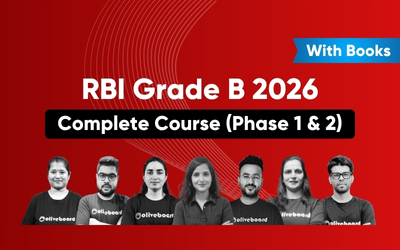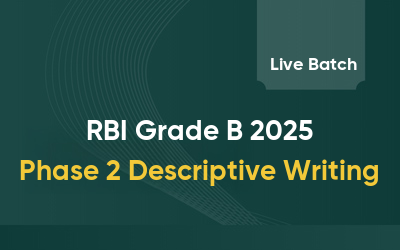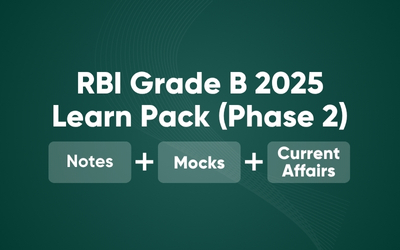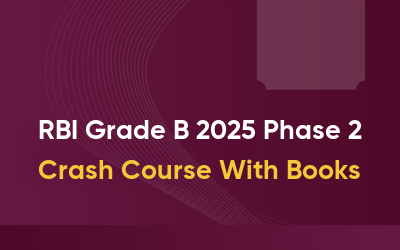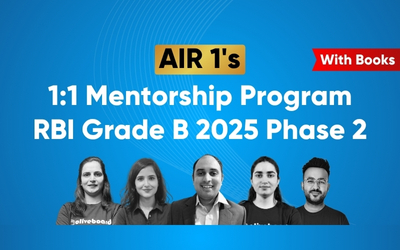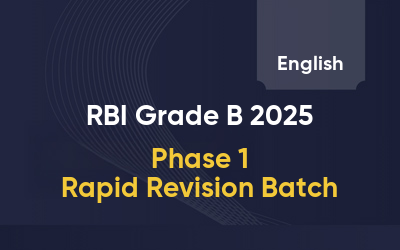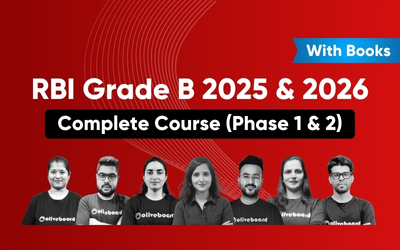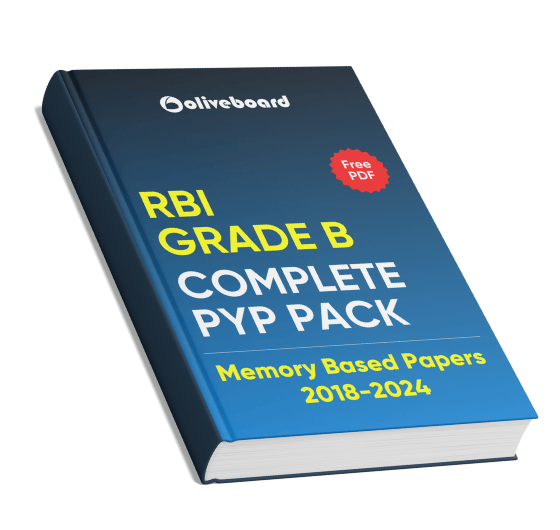RBI Grade B Syllabus 2026: The RBI Grade B Officer selection is being done based on 3 stages, and syllabus for each of this phase of examination varies. As per previously released official Notification the Phase 1 includes four subjects: General Awareness, English Language, Quantitative Aptitude, and Reasoning Ability. Phase 2 consists of three papers combining objective and descriptive types, including ESI, English (Writing Skills), and FM for the General stream. Check the detailed article below for a complete syllabus breakdown and preparation tips.
RBI Grade B Syllabus 2026
The RBI Grade B Syllabus 2026 includes General Awareness, English Language, Quantitative Aptitude, and Reasoning in Phase I. Phase II has three papers: Economic & Social Issues, English (Writing Skills), and Finance & Management. Candidates who clear Phase II appear for the interview. As per toppers and experts, aspirants must start preparing for Phase 2 as well along with Phase 1 and aspirants should not wait for the RBI Grade B Notification to be released in order to start their preparation. Since Phase 2 carries significant weight in the final selection, early preparation would help in reducing last-minute stress.
| Stage | Syllabus / Components |
|---|
| Phase I | - General Awareness - English Language - Quantitative Aptitude - Reasoning |
| Phase II | - Economic & Social Issues - English (Writing Skills) - Finance & Management |
| Interview | Prepare concurrently with Phase II; focus on communication, confidence, and subject knowledge |
Attempt RBI Grade B Mock Test
RBI Grade B Officer Syllabus
RBI Grade B Officer syllabus is designed to check a candidate's knowledge and skills in areas like finance, economics, reasoning, and management. Exam is held in two phases. Phase 1 (Prelims) includes Quantitative Aptitude, Reasoning, English, and General Awareness, which covers current affairs and banking-related topics. Phase 2 (Mains) includes Economic and Social Issues (ESI), Finance and Management (FM), and Descriptive English. These subjects focus on Indian economy, financial markets, banking system, management basics, and writing skills. Having a good understanding of syllabus helps candidates prepare in a better way and perform with confidence in exam.
What topics are covered in RBI Grade B phase 1 exam?
Explore the RBI Grade B Phase 1 Syllabus of all subjects to understand the key components. Mastering these sections is important for securing a strong performance in the RBI Grade B exam.
| Subject | Topics Covered |
|---|
| Reasoning | Logical Reasoning, Alphanumeric Series, Ranking/Direction/Alphabet Test, Data Sufficiency, Coded Inequalities, Seating Arrangement, Puzzle, Tabulation, Syllogism, Blood Relations, Input Output, Coding Decoding |
| Quantitative Aptitude | Simplification, Profit & Loss, Mixtures & Allegations, Simple Interest & Compound Interest, Surds & Indices, Work & Time, Time & Distance, Mensuration (Cylinder, Cone, Sphere), Data Interpretation, Ratio & Proportion, Percentage, Number Systems, Sequence & Series, Permutation, Combination & Probability |
| English Language | Reading Comprehension, Cloze Test, Para Jumbles, Miscellaneous, Fill in the Blanks/Fillers, Multiple Meaning/Error Spotting, Paragraph Completion, Word Rearrangement, Idioms & Phrases, Sentence Improvement, Column-Based Questions, New Pattern Questions |
| General Awareness | Current Affairs: National News (MoUs, Summits, Major Events), International News (Summits, Conferences Abroad), Financial & Economics News Financial Awareness: RBI & SEBI Notifications and Regulations, Defence (Military Exercises, Updates), Days in News, Persons in News (Obituaries, Appointments, Retirements), Sports, Science, Technology & Space, Awards & Honours, Environment, Banking, Economy-related News Reports & Government Schemes: Books & Authors GA Static: Chief Ministers & Cabinet Ministers, National Parks & Sanctuaries, Airport Locations, Stadiums, Organisations' Headquarters, Banks' Headquarters & Taglines, Power Plants in India, Indian Dance Forms, Countries' Capitals & Currencies, Important Days |
Attempt RBI Grade B Previous Year Papers
What topics are covered in the RBI Grade B phase 2 ESI paper?
The RBI Grade B Syllabus for ESI covers all economic and social issues, including development, globalization, and sustainability. It also addresses social problems and demographic trends. Aspirants must understand these concepts and their impact nationally and internationally.
| Topic | Subtopics Covered |
|---|
| Growth and Development | Measurement of growth: National Income and Per Capita Income, Poverty Alleviation and Employment Generation in India, Sustainable Development, Environmental Issues |
| Indian Economy | Economic History of India, Changes in Industrial and Labor Policy, Monetary and Fiscal Policy since 1991 reforms, Priorities and Recommendations of Economic Survey and Union Budget, Indian Money and Financial Markets: Linkages with the Economy, Role of Indian Banks and Reserve Bank in Development, Public Finance, Political Economy, Industrial Developments in India, Indian Agriculture, Services Sector in India |
| Globalization | Opening up of the Indian Economy, Balance of Payments, Export-Import Policy, International Economic Institutions (IMF, World Bank), WTO, Regional Economic Cooperation, International Economic Issues |
| Social Structure in India | Multiculturalism, Demographic Trends, Urbanization and Migration, Gender Issues, Social Justice |
Know about personalized guidance from AIR-1
What topics are covered in the RBI Grade B phase 2 FM paper?
The General Finance & Management (FM) in RBI Grade B Exam Syllabus focuses on assessing candidates' knowledge of financial concepts, financial markets, and risk management. The finance and management for RBI Grade B Syllabus includes topics such as financial institutions, market instruments, financial services, risk management, and more.
| Topic | Subtopics Covered |
|---|
| Financial System | Structure and Functions of Financial Institutions, Functions of the Reserve Bank of India, Banking System in India – Structure and Developments, Financial Institutions (SIDBI, EXIM Bank, NABARD, NHB, NaBFID, etc.), Recent Developments in Global Financial System and its Impact on Indian Financial System, Role of Information Technology in Banking and Finance, Non-Banking System, Developments in Digital Payments |
| Financial Markets | Primary and Secondary Markets (Forex, Money, Bond, Equity, etc.), Functions, Instruments, and Recent Developments |
| General Topics | Financial Risk Management, Basics of Derivatives, Global Financial Markets & International Banking (Trends & Developments), Financial Inclusion, Alternate Sources of Finance, Private & Social Cost-Benefit, Public Private Partnership, Corporate Governance in Banking Sector, The Union Budget – Concepts, Approach & Trends, Basics of Accounting & Financial Statements (Balance Sheet, Profit & Loss, Cash Flow Statements), Ratio Analysis (Debt to Equity, Debtor Days, Creditor Days, Inventory Turnover, ROA, ROE), Inflation – Definition, Trends, Estimates, Consequences & Remedies, Balancing Inflation & Growth through Monetary & Fiscal Policies |
| Fundamentals of Management & Organizational Behavior | Introduction to Management, Evolution of Management Thought (Scientific, Administrative, Human Relations, Systems), Management Functions & Managerial Roles, Nudge Theory, Organizational Behavior Concepts, Personality (Factors, Big Five Model), Reinforcement, Perception & Perceptual Errors, Motivation (Content & Process Theories), Leadership (Trait, Behavioural, Contingency, Charismatic, Transactional, Transformational), Emotional Intelligence, Analysis of Interpersonal Relationships (Transactional Analysis, Johari Window), Conflict (Concept, Sources, Types, Management), Organizational Change & Development (Lewin's Change Model, Action Research, Positive Model) |
| Ethics at the Workplace & Corporate Governance | Meaning of Ethics, Reasons for Ethical Problems, Theories of Ethics (Utilitarianism, Rights & Duties, Justice & Fairness, Ethics of Care, Virtue Ethics, Teleological, Egoism, Relativism), Moral Issues in Business (Compliance, Finance, HR, Marketing), Ethical Principles in Business, Organization Structure & Ethics, Role of Board of Directors, Best Practices in Ethics Programme, Code of Ethics & Code of Conduct, Corporate Governance (Factors & Mechanisms), Communication (Steps, Channels, Oral vs Written, Verbal vs Non-verbal, Upward/Downward/Lateral, Barriers, Role of IT) |
Download RBI Grade B 2024 AIR 1 Handwritten Notes
What is the RBI Grade B English writing skills syllabus?
This section focuses on the writing skills of the aspirants. The candidates must be well prepared for the descriptive paper. They must focus on Current topics in news and should read newspapers to develop analytical skills. Three questions are asked from the following sections:
- Essay: In the Descriptive English section of Phase 2, candidates are provided with five essay topics. You are required to select one and compose an essay ranging from 400 to 600 words, demonstrating your analytical and writing skills.
- Precis Writing: The Precis Writing task in Phase 2 involves summarizing a given passage of approximately 400–600 words into 170–180 words, assessing your ability to summarise information effectively.
- Reading Comprehension: In the Reading Comprehension section of Descriptive English, a passage is provided, followed by five questions. Candidates must answer these questions in short descriptive formats, evaluating their comprehension and articulation skills.
Explore RBI Grade B Courses
RBI Grade B Interview
RBI Grade B 2026 official notification is yet to be released. However, based on the 2025 structure, candidates can get a clear idea of what to expect in the interview round. The interview phase includes two key components: a psychometric test and a personal interview. While there is no officially defined RBI Grade B syllabus for this stage, here's an overview of what it generally involves:
Psychometric Test
This test evaluates your personality traits through a series of statement-based questions. You'll be asked to select from the following responses:
- Strongly Agree
- Agree
- Neither Agree nor Disagree
- Disagree
- Strongly Disagree
These questions are designed to understand how you perceive yourself in workplace situations and team settings. Sample questions may include:
- I never make a mistake at work.
- I prefer working alone rather than in a team.
- I need little to no supervision to complete my tasks.
- I enjoy being a leader.
Interview
The interview is conducted by a panel and focuses on areas such as:
- Your educational background
- Work experience (if any)
- Personal interests and hobbies
- Awareness of current affairs and economic developments
The objective is to assess your overall personality, clarity of thought, communication skills, and suitability for the RBI Grade B role.
Download RBI Grade B Syllabus PDF
Download the complete RBI Grade B Syllabus PDF for an offline-friendly version, covering both Phase 1 and Phase 2 topics comprehensively.
Click Here to Download the RBI Grade B Syllabus PDF
RBI Grade B Selection Process 2026
The RBI Grade B 2026 selection process differs by post. For General post, it includes Prelims, Mains, and an Interview. For DEPR and DSIM posts, there's a Written Exam followed by an Interview. Final selection is based on performance in all stages.
| Phase | Components |
|---|
| Phase 1 (Prelims) | Objective test – GA, English, Quant Reasoning; ~200 MCQs, total marks & cut-offs apply |
| Phase 2 (Mains) | Objective + Descriptive papers: ESI (50 objective + 50 descriptive) English (Descriptive Writing) FM (50 objective + 50 descriptive) |
| Interview | 75 marks; final merit based on Phase 2 + Interview |
RBI Grade B Exam Pattern 2026
To gain a thorough understanding of the specific subjects, time limits, and scoring criteria for each phase, please refer to the phase wise RBI Grade B Exam Pattern provided in detail below:
Phase 1:
RBI Grade B Phase 1 includes 4 subjects, their detailed exam pattern is provided in the below table:
| Section | Questions | Marks | Duration |
|---|
| Reasoning Ability | 60 | 60 | 45 mins |
| English Language | 30 | 30 | 25 mins |
| Quantitative Aptitude | 30 | 30 | 25 mins |
| General Awareness | 80 | 80 | 25 mins |
| Total | 200 | 200 | 120 mins |
Phase 2:
The Exam Pattern of RBI Grade B Phase 2 consists of three papers: Paper 1, Paper 2, and Paper 3. Check out some important highlights below:
| Paper | Subject | Type | No. of Questions | Marks | Duration |
|---|
| Paper I | Economic & Social Issues | 50% Objective, 50% Descriptive | 30 (Objective), 6 (Descriptive; attempt 4) | 100 | 120 minutes (30 mins Objective + 90 mins Descriptive) |
| Paper II | English (Writing Skills) | Descriptive | 3 (Precis, Essay, Comprehension) | 100 | 90 minutes |
| Paper III | Finance & Management | 50% Objective, 50% Descriptive | 30 (Objective), 6 (Descriptive; attempt 4) | 100 | 120 minutes (30 mins Objective + 90 mins Descriptive) |
Preparation tips for RBI Grade B exam
Cracking the RBI Grade B 2026 exam requires a smart preparation strategy and focused planning. Given the exam's high competition level, understanding the complete RBI Officer Grade B syllabus and following the right study approach is essential. If you are wondering how to crack RBI Grade B exam, here are some effective tips to guide your preparation.
| Tip | Details |
|---|
| Know the Exam Pattern & Syllabus | Understand Phase 1 & Phase 2 syllabus and exam structure to plan your preparation smartly. |
| Make a Study Plan | Create a realistic timetable, focus on weak areas, and include revision, mocks, and current affairs. |
| Stay Updated with Current Affairs | Follow banking, finance, and economy news daily through newspapers or monthly updates. |
| Practice Mock Tests | Take full-length mock tests regularly and learn from mistakes to improve time management. |
| Improve Descriptive Writing | Practice essays, precis, and structured answers for English and ESI/FM papers. |
| Use Quality Study Material | Stick to a few reliable books and online resources, and revise them well. |
| Revise Regularly | Set aside weekly revision time to reinforce concepts and practice questions. |
| Stay Calm and Positive | Take care of your health, sleep well, stay motivated, and remain consistent in preparation. |
Which is the best online courses for RBI Grade B?
Oliveboard offers some of the most effective and structured courses tailored to meet the specific needs of aspirants across all stages of the exam, including complete coverage of the RBI Grade B Syllabus.
These are just a few of the many valuable courses available to help you prepare effectively. Click here to explore all RBI Grade B online courses and find one that fits your needs best.
Key Takeaways
Here is a table summarizing the RBI Grade B Syllabus:
| Stage | Subjects/Papers | Format | Key Topics | Notes |
|---|
| Phase I (Prelims) | General Awareness, English Language, Quantitative Aptitude, Reasoning Ability | Objective | Current affairs, basic economics, reasoning, English grammar & comprehension, quantitative problems | Sectional & overall cut-offs; Hindi & English (except English section) |
| Phase II (Mains) | Paper I – Economic & Social Issues (ESI) | 50% Objective + 50% Descriptive | Indian economy, globalization, social issues, financial systems | Time-bound; Hindi & English |
| Paper II – English (Writing Skills) | Descriptive | Essay writing, précis, comprehension | Only in English |
| Paper III – Finance & Management (FM) | 50% Objective + 50% Descriptive | Management concepts, accounting, finance, ethics in the workplace | Hindi & English |
| Interview | Personality Assessment | Oral | Communication skills, awareness of current events, personality traits | Final selection weightage; thorough preparation recommended |




















































































